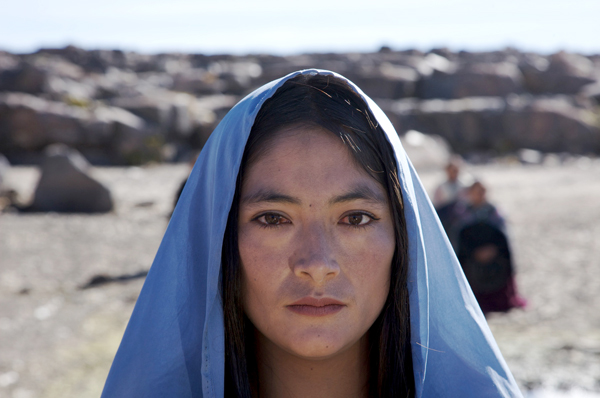|
Reviews of Recent Independent, Foreign, & Documentary Films in Theaters and DVD/Home Video

ALTIPLANO The tragedy of Altiplano is ominously foretold in the opening sequence in Peru. Slowly filing out of a dark church into the blinding light, a procession of villagers follow the men carrying a statue of the Madonna, but they become distracted by the appearance on the ground of shiny globules—liquid mercury. The men stumble, and their patron saint falls and breaks into pieces. The village is left without protection, preventing the wedding of the keeper of the statue, Saturnina (Magaly Solier), to her fiancé, Ignacio (Edgar Quispe). He must again complete the arduous task of collecting sacramental water high up from the glaciers, while Saturnina anxiously presses a blind sculptor to repair the shattered statue. Outside church ruins on the other side of the world, in Belgium, an Iranian photojournalist, Grace (Jasmin Tabatabai), is still in shock from working in Iraq, where she was forced to photograph a murder. Her husband Max, (Olivier Gourmet) urges her not to quit: “Independent photographers are our only hope.” He’s an ophthalmologist preparing to leave for a mission to perform cataract operations at a clinic near the Andean village in the opening sequence. The doctors at Max’s clinic start to make the connection between the increasing numbers of patients with blindness and other escalating health problems, including Saturnina’s mother and Ignacio, and the procession of trucks rumbling through the stark landscape toward large mining operations. Carelessly disposed, mercury has seeped into the water table, evaporating without leaving evidence. As one doctor says, “No proof, no problem.” (This disaster is based on an actual mercury spill in the village of Choropampa in 2000.) But the distraught villagers blame all the gringos for bringing devastation to their families, and Max gets caught in the middle. More and more, the drama blends into dreams and stylized rituals to emulate the spiritual power of indigenous storytelling. Belgian Peter Brosens and American Jessica Woodworth previously co-directed Khadak (2006), which adapted native traditions to look at urbanization through the eyes of rural Mongolian migrants. Brosens made documentaries about violent political protests in the Andes in the 1990’s, and the use of local elements is more visually effective here as Saturnina dedicates herself to becoming a shamanistic Erin Brockovich. Dressed in her wedding dress, she uses a camera to capture her sacrificial statement against invisibility and silence. Paralleling Grace, she declares “Without an image, there is no story.” Through Hungarian cinematographer Francisco Gózon’s camera movements, the story unfolds between reality and myth. His camera slowly circles the static characters, first in close-ups, then glides across the magnificent landscape (the title means plateau) so that they are juxtaposed against mountains, the sky, and the rivers with their unseen pollution. (You can almost feel the crew’s reaction to the thin air up at that altitude.) Stirring
symphonic music is used operatically to express the community’s anger,
pieces by
Richard Einhorn
and Henryk Górecki. But the film works too hard to bring European, and
even Middle Eastern, issues to the village, via the photographer and her
husband, in order to share a universal grief, while overplaying the
metaphors about blindness and sight. Altiplano is most moving
when it relishes the passionate theatricality of folk rituals, even with
some surrealism, for a combination of the poetic with the political.
Nora Lee Mandel
|

